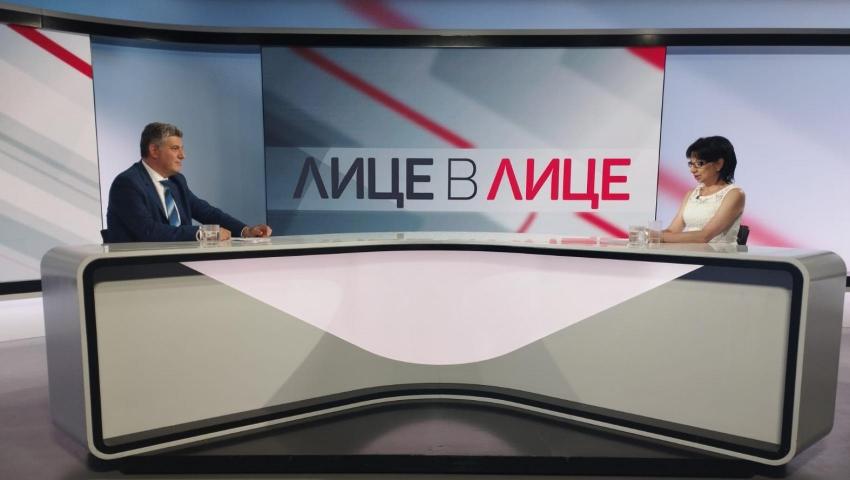Minister Tsekov: MRRD has three conditions for the builders of the "Hemus" highway
It is in the public interest that construction of the highway should begin, albeit with these flawed in-house contracts

Source: MRRB
When concluding the in-house contracts for the construction of the "Hemus" motorway in the period 2018-2020, the Law on Public Procurement was bypassed. There is a clear ruling on this, including by the "Legal" Directorate at the Ministry of Internal Affairs and Communications. This was stated by the Minister of Regional Development and Public Works Andrey Tsekov in the program "Face to Face" on bTV.
In the period in question, 2018-2020, the state assigned a hollow state company "Automagistrali" work that it cannot perform. The implementation of almost the entire "Hemus" highway has been outsourced to private companies under contracts for the supply of materials, rental of machinery, the minister recalled. Tsekov was adamant that the Public Procurement Act was violated here as well, since "Automagistrali" is a public contracting authority and should award through public procurement.
According to the Public Procurement Act, a contract concluded without a public procurement, when one should have been carried out, is voidable, and the contracting authority can file a claim before the court to declare it voidable. The time for presenting it is one year from the conclusion of the contract. For the in-house contracts for AM "Hemus", a claim should have been made either by the end of 2021 or by the end of 2022, depending on the latter of the concluded contracts. "One of the first actions I took as a regional minister is to assign to the Legal Directorate an analysis of whether the preclusion periods have expired. The opinion categorically confirmed that, as of today, all the terms in which MRRD could file claims for destruction have expired," the regional minister added. The previous rulers did not have the political will and moral determination to take these contracts to court, he emphasized.
Once the time limits for filing a claim have expired, according to the ZOP the contracts are already considered normal regular contracts.
Minister Andrey Tsekov explained that there are two ways to resolve the inheritance with illegal in-house assignments. Either to continue to perform them, or to look for grounds for their termination. The second option will lead to heavy lawsuits. If grounds for termination are found, new procurement would have to be awarded, which would take about a year with appeals. In such a case, in 2025 it will be possible to resume the construction of the "Hemus" motorway.
"It is in the public interest that the construction of AM "Hemus" starts. We created a working group to propose a decision to possibly continue the construction of the highway under three conditions that would protect the public interest. The private companies, which are the real contractors, will have to undertake a quality guarantee for the construction within the period provided by the Spatial Planning Law, which is 7 years after the site is ready. According to the current contracts, the guarantee is 2 years. The second condition is that the advances should not be indexed, since this is money that the contractors received and should have bought materials. For the remaining part of the contracts - about 1 billion, a formula must be sought so that they are completed at prices current at the moment. The price increase will not be double, as is claimed in the public space, but is expected to be around 25-30%. The final amount will become clear after the working group on the case makes the exact calculations", Minister Tsekov explained.
He was categorical that the practice of using the state company "Automagistrali" as a black box into which public finances are poured and spent without public procurement will be stopped. The idea is for the company to become a management state company that will exercise control over the implementation of large infrastructure projects.
"The big problem in the country is the lack of ready-made projects to work on. There was a vicious practice where all repairs were done in-house or under ongoing repair and maintenance contracts. This system was maintained deliberately, because the goal was to avoid assignments through public procurement and to do everything relatively in the dark," the regional minister also said.
He added that in the first six months of 2023, the funds spent on basic repairs are slightly over BGN 2 million, and on new construction - BGN 242 million.
Due to political indecision to find solutions to the complex problems inherited from the 2020 administration, there are frozen projects.
"There is and always has been money for roads in the state. So far, there is a lack of strategic planning. In order to build today, we must have designed 2 years ago. We must start working strategically and plannedly, and this is my ambition", said Tsekov.
In connection with the protests due to the increase in toll fees, the minister assured that there is a tendency for the reasonable proposals from the carriers, related to the provision of discounts, to be accepted. The annual revenues from tolls and vignettes are about a quarter of the necessary funds for the maintenance and construction of new roads, explained the minister.
